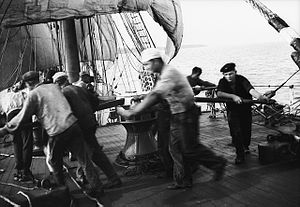I am tired of every “expert” wanting to fight me over this.
It seems that ever since Nathan Evans covered, on TikTok, The Longest John’s version of The Wellerman everyone loves sea shanties. And because of the misinformation supplied by Ubisoft in its video game, Assassin’s Creed IV: Black Flag, any old song in the world can be called a sea shanty, evidently.
On the Reddit website there is a discussion group for sea shanties /seashanties. Its member list has swelled from about 26,000 to a whopping 91,400 in the last year or so. Of these 91,400 people who LOVE sea shanties, I would estimate that only about 50 individuals actually understand what a sea shanty really is, based on the constant discussions found there. For a while I tried to be a friendly evangelical musicologist, offering what the differences are between a sea shanty and a maritime-themed song or an Irish drinking song, or a Scots ballad, but the resistance to facts is ridiculously pervasive. One person on there, when advised that sea shanties were work songs for tall ship sailors in the age of sail, struck back in a righteous tirade: “I refuse to believe that a musical genre can be so narrowly defined!” I gave him a list of books to discover and digest, but actual education was anathema to their feelings. I have had about a dozen similar efforts, most simply wasted energy on my part. I just checked in to the group discussion as I write this, and poor David Gallows of the European shanty-rock group, Pyrates, is fighting the good fight with mixed results.
In the Facebook group, History of old sailing ships, some fellow, in response to the question, “What are some popular sea shanties?” offered Assassin’s Creed 4 : Black Flag – Sea Shanty Edition (Full Official Soundtrack). I advised that, “Maybe fully half of those are NOT sea shanties.” Some random person then challenged me with, “What is a sea shanty according to you?“
Being exhausted from repeatedly going through this exercise, I replied, “sorry, it’s not my job to educate you. There are a bunch of books available for you to do your own research. You can start with the Wikipedia article, which is pretty good, except for the individuals who have repeatedly corrupted the definition in the beginning paragraphs. But read the stuff about sea shanties being work songs from a specific period of time.” And by my exception to the Wikipedia article I mean that the weakness of Wikipedia is that anyone can persistently log in and insert into the definition, “However, in recent, popular usage, the scope of its definition is sometimes expanded to admit a wider range of repertoire and characteristics, or to refer to a “maritime work song” in general.” That sentence simply makes no sense; that is not at all how definitions work! It seems to me that someone with no actual knowledge of music history or certainly maritime music is inserting this “exception” because the rest of the article is quite complete and scholarly. As I’ve said repeatedly before, you can call your goat a sheep all day long, but when you bring your goat to a sheep-shearing you’re going to be pretty embarrassed. We live in a era where the knowledge of the ages is available to us through tiny little devices in our pockets – have we lost the ability to conduct research and to use critical thinking?

Looking at the Spotify instance of Assassin’s Creed 4 : Black Flag – Sea Shanty Edition (Full Official Soundtrack) we see:
Randy Dandy Oh — Capstan or Pump Shanty
Maid of Amsterdam — Capstan or Pump Shanty
Leaver Her Johnny — Halyard or Pump Shanty
Whiskey Johnny — Halyard Shanty
Good Morning Ladies (All) — Capstan Shanty
Fish in the Sea — Capstan Shanty
Dead Horse — Ceremonial Song, later a Halyard Shanty
Running Down to Cuba — Forebitter
Trooper and the Maid — Scottish Folk Song
William Taylor — British Folk Song
Patrick Spens — British Ballad
Fathom the Bowl — English Drinking Song
Admiral Benbow — British Ballad
All for Me Grog — British Isles Drinking Song
Buleria Modern — contemporary flamenco song by David Bisbal
Verdiales Modern — flamenco song
So, of these 16 songs only seven of them are documented sea shanties and ONLY if you count Dead Horse, which was traditionally a song originally only sung at the time in a voyage when the sailors paid off their advances and started earning their own money.
Next time I will share how and why there are absolutely ZERO documented pirate sea shanties or Viking sea shanties.